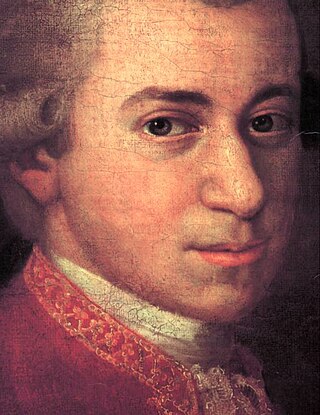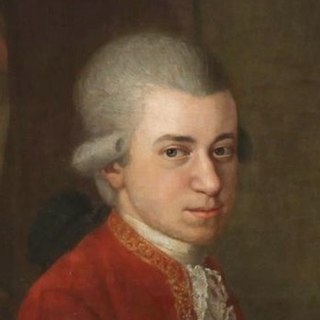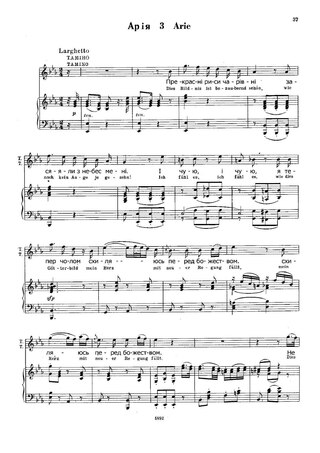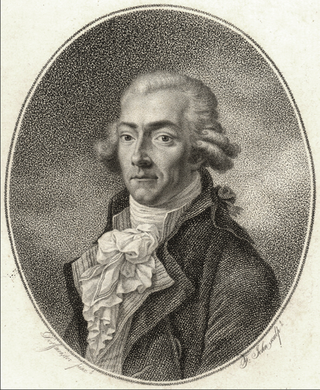Origin
The work was written sometime between 1785 and 1787. [2] On 2 September 1788, Mozart entered it into his personal catalog of works as part of a set of ten canons. [1] Although some of the canons in the set of ten have serious (that is, religious) lyrics, K. 559a was meant for fun, a gesture of mocking, scatological humor directed at a friend of Mozart's, the baritone Johann Nepomuk Peyerl [ es ] (1761–1800). [3] The canon begins:
O, du eselhafter Peierl
O, du peierlhafter Esel
Oh, you asinine Peierl
oh you Peierline ass.
Later, the lyrics include "O leck mich doch geschwind im Arsch" ("Oh lick me real quick in the ass (arse)" [4] ), a favorite expression in Mozart's scatological works. For more examples and discussion, see Mozart and scatology.
"O du eselhafter Peierl" was originally intended to be sung immediately following "Difficile lectu". For the tale of how these two canons originated, see "Difficile lectu".

Wolfgang Amadeus Mozart, baptised as Joannes Chrysostomus Wolfgangus Theophilus Mozart, was a prolific and influential composer of the Classical period. Despite his short life, his rapid pace of composition resulted in more than 800 works of virtually every genre of his time. Many of these compositions are acknowledged as pinnacles of the symphonic, concertante, chamber, operatic, and choral repertoire. Mozart is widely regarded as among the greatest composers in the history of Western music, with his music admired for its "melodic beauty, its formal elegance and its richness of harmony and texture".

Friedrich Melchior, Baron von Grimm was a German-born French-language journalist, art critic, diplomat and contributor to the Encyclopédie ou Dictionnaire raisonné des sciences, des arts et des métiers. In 1765 Grimm wrote Poème lyrique, an influential article for the Encyclopédie on lyric and opera librettos. Like Christoph Willibald Gluck and Ranieri de' Calzabigi, Grimm became interested in opera reform. According to Martin Fontius, a German literary theorist, "sooner or later a book entitled The Aesthetic Ideas of Grimm will have to be written."

Maria Aloysia Antonia Weber Lange was a German soprano, remembered primarily for her association with the composer Wolfgang Amadeus Mozart.

Symphony No. 35 in D major, K. 385, also known as the Haffner Symphony, was composed by Wolfgang Amadeus Mozart in 1782. It was commissioned by the Haffners, a prominent Salzburg family, for the occasion of the ennoblement of Sigmund Haffner the Younger. The Haffner Symphony should not be confused with the eight-movement Haffner Serenade, another piece Mozart wrote on commission from the same family in 1776.

"Dies Bildnis ist bezaubernd schön" is an aria from Wolfgang Amadeus Mozart's 1791 opera The Magic Flute. The aria takes place in act 1, scene 1, of the opera. Prince Tamino has just been presented by the Three Ladies with an image of the princess Pamina, and falls instantly in love with her.
"Leck mich im Arsch" is a canon in B-flat major composed by Wolfgang Amadeus Mozart, K. 231 (K. 382c), with lyrics in German. It was one of a set of at least six canons probably written in Vienna in 1782. Sung by six voices as a three-part round, it is thought to be a party piece for his friends.

On 5 December 1791, the composer Wolfgang Amadeus Mozart died at his home in Vienna, Austria at the age of 35. The circumstances of his death have attracted much research and speculation.

Götz von Berlichingen is a successful 1773 drama by Johann Wolfgang von Goethe, based on the memoirs of the historical adventurer-poet Gottfried or Götz von Berlichingen. It first appeared in English in 1799 as Goetz of Berlichingen of the Iron Hand in a rather free version by Walter Scott.

"Leck mir den Arsch fein recht schön sauber" is a canon for three voices in B-flat major, K. 233/382d. The music was long thought to have been composed by Wolfgang Amadeus Mozart during 1782 in Vienna, but now thought to be the work of Wenzel Trnka. The lyrics appear to stem from Mozart.

Scholars have long studied how Wolfgang Amadeus Mozart created his works. Nineteenth-century views on this topic were often based on a romantic, mythologizing conception of the process of composition. More recent scholarship addresses this issue by systematically examining authenticated letters and documents, and has arrived at rather different conclusions.

"Conservati fedele" is a concert aria for soprano and orchestra by Wolfgang Amadeus Mozart.
"Difficile lectu", K. 559, is a canon composed by Wolfgang Amadeus Mozart. The music, in F major, is set for three singers. The words are probably by Mozart himself.
Bona nox! bist a rechta Ox, K. 561, is a canon in A major for four voices a cappella by Wolfgang Amadeus Mozart; Mozart entered this work into his catalogue on 1788 as part of a set of ten canons.

The composer Wolfgang Amadeus Mozart wrote a great deal of dance music, both for public use and as elements of larger works such as operas, quartets, and symphonies. According to the reminiscences of those who knew him, the composer himself enjoyed dancing very much; he was skillful and danced often.

The Rondo in A minor, K. 511, is a work for solo piano by Wolfgang Amadeus Mozart.

Bölzlschiessen was a form of domestic recreation that involved shooting darts at decorated targets with an air gun. It is remembered as an activity of Leopold Mozart, his family, and their friends. The most famous participant was Leopold's son Wolfgang Amadeus Mozart, who began playing at the age of ten or earlier.
Wolfgang Amadeus Mozart displayed scatological humour in his letters and multiple recreational compositions. This material has long been a puzzle for Mozart scholarship. Some scholars try to understand it in terms of its role in Mozart's family, his society and his times; others attempt to understand it as a result of an "impressive list" of psychiatric conditions from which Mozart is claimed to have suffered.
Wenzel Trnka von Krzowitz was a physician, professor, and amateur composer of the 18th century.
"Leck mich im Arsch" is a song by Insane Clown Posse and Jack White. The lyrics are inspired by Leck mich im Arsch, a scatological canon by Wolfgang Amadeus Mozart, while the music is based on a canon called Leck mir den Arsch fein recht schön sauber. The latter has for two centuries been attributed to Mozart but evidence has shown that the music of the piece was composed by Wenzel Trnka and Mozart merely replaced the original lyrics with his own.

Francesco Benucci was an Italian bass/baritone singer of the 18th century. He sang a number of important roles in the operas of Wolfgang Amadeus Mozart, Antonio Salieri and other composers.













